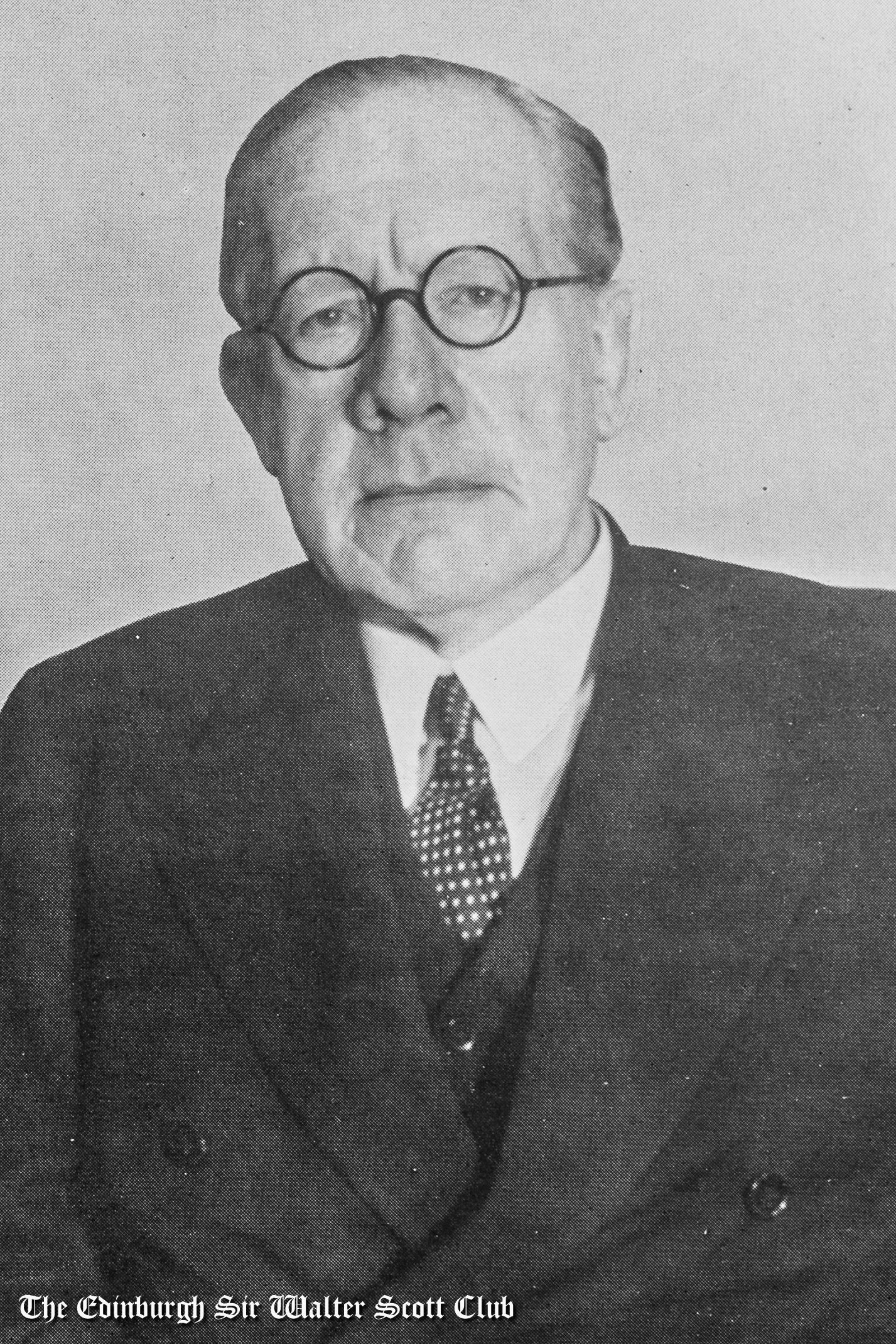1950
Our President in 1950/51 was:
The Right Hon. Walter E. Elliot
He proposed the Toast to Sir Walter at our 43rd Annual Dinner on Friday 12th January 1951 in The North British Station Hotel
Download the [transcript] or read the [bulletin]
Summary of the Speech:
Walter Elliot delivers a richly textured, deeply literary tribute to Sir Walter Scott, threading together themes of Edinburgh identity, classical and local tradition, scholarship, moral clarity, and international influence. His speech is not merely an homage but a profound meditation on Scott’s spirit, intellect, and continuing cultural resonance.
Key Points and Themes
- Personal Modesty and Civic Pride:
- Elliot acknowledges he is not a dramatist, soldier, or divine like previous speakers, but takes pride in being a Freeman of Edinburgh—a title Scott was born to, but Elliot earned through a lifetime in politics.
- Scott as the Embodiment of Edinburgh:
- Describes Scott as "Edinburgh incarnate," linking his genius to the city’s spirit, landscape, architecture, and literary tradition.
- Draws parallels between Scott and Robert Louis Stevenson—both advocates and literary giants shaped by Edinburgh.
- Tradition of Learning and Talk:
- Traces a lineage of eloquence through figures like Lord Dunedin, Noel Skelton, Craigie Aitchison, and Douglas Young.
- Paints Edinburgh as a “Modern Athens,” steeped in rationality (sophrosyne), echoing Socratic ideals of learned discussion.
- Scott’s Supernatural as Rational:
- Contrasts Scott’s sane, observational engagement with the supernatural with the wilder, more immersive tone of Burns’s Tam o’ Shanter.
- Highlights Scott’s ironic distance and craftsmanship in Wandering Willie’s Tale, positioning him as Orpheus in Hell—never fully consumed by what he explores.
- Comparison with Burns:
- Compares Tam o’ Shanter and Wandering Willie’s Tale as literary siblings in different forms.
- Appreciates Scott’s minimal corrections and instinctive fluency in manuscript—“the pen galloping across the page.”
- Madge Wildfire and Literary Range:
- Juxtaposes Scott’s grotesque and hallucinatory imagery in Old Mortality with the lyrical minimalism of Proud Maisie.
- Offers manuscript insight: Scott wrote three stanzas in one gush; faltered, then added a fourth, weaker stanza after a pause.
- Scott’s Humility and Erudition:
- Cites Scott’s deep research habits—poring over medieval maps and botanical details.
- Notes how this humility was joined by “royal magnanimity,” enabling Scott to depict both Edinburgh’s elite and its outcasts with equal grace.
- International Influence:
- Scott founded not just a school but a global literature.
- Influenced Dumas (who became a novelist after reading Ivanhoe), Victor Hugo, Dostoevsky, and even the Polish historical novelists.
- References Hugo’s comic mistranslation of the Firth of Forth and the Cossack Ataman Platov’s homage in Paris.
- Linguistic Mastery:
- Scott was equally at home in Scots and English.
- His peasants and nobles alike speak with natural fluency in their native idiom—without artificiality.
- Latinate Wit and Dunbar’s Legacy:
- Celebrates the pedantry and rhetorical flair of King James VI and the poet Dunbar.
- Quotes from Dunbar’s praise of London to contrast with modern chauvinism, promoting literary generosity.
Interesting Points Worth Highlighting
- The Socratic Dinner Parallel: Elliot draws an erudite and humorous parallel between Edinburgh dinners and the Symposium of Socrates, complete with drunkenness, argument, and philosophical clarity.
- “Bring in the loch”: This local phrase is affectionately used as a metaphor for curing hangovers—suggesting the tempering sanity of Edinburghers after indulgence.
- “The Shirra” (Sheriff): Scott’s nickname among his contemporaries is used with reverent affection, particularly in Stevenson’s remark about having been “patted on the head” by him.
- Latin and Greek Fluency: The speech is peppered with untranslated but contextually explained Latin and classical Greek, highlighting the Club’s intellectual tone.
- Profound Closing Toast: The address culminates in the claim that being acknowledged by Scott, even figuratively, remains the highest distinction a Scotsman could aspire to.
Final Note
Walter E. Elliot’s 1951 toast is a masterclass in rhetorical elegance and literary homage. It draws upon classical, civic, and emotional registers to construct a vision of Scott not only as a great writer, but as a living embodiment of Edinburgh’s best ideals. It remains one of the richest and most intellectually layered toasts in the Club’s history.
Download the [transcript] or read the [bulletin]

Subsidiary Toasts*
The toasts of "The King" and "The Royal Family" were duly honoured.
Thereafter Mr T. P. M‘Donald, K.C., proposed the toast of “The Imperial Forces,” to which Lieut.-General Sir Gordon M‘Millan, K.C.B., C.B.E., D.S.O., M.C., D.L., replied.
“The City of Edinburgh” was proposed by Professor Sir Godfrey Thomson, D.C.L., D.Sc., Ph.D., and replied to by Bailie R. Bell on behalf of the Lord Provost.
The health of the Chairman was proposed by
Professor F. A. E. Crew, M.D., D.Sc., Ph.D., F.R.S., F.R.C.P. Ed.
*It is regretted that it has proved impracticable to reproduce the speeches other than that of the Chairman.


